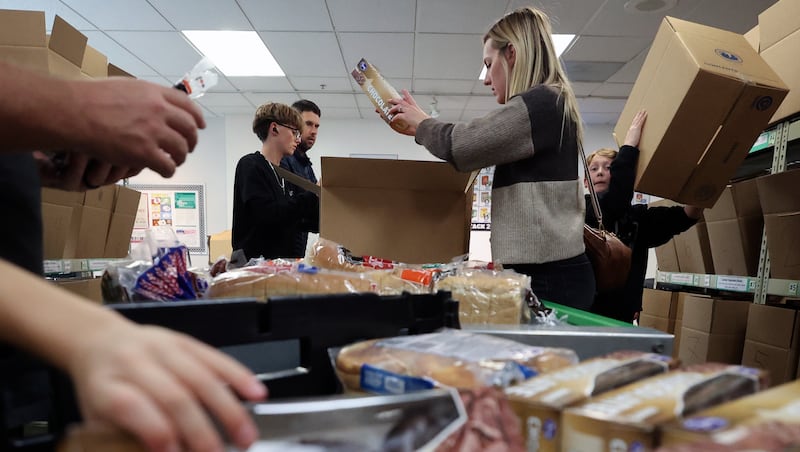
The Struggle for Food Assistance Amid Political Uncertainty
Food banks and food pantries are experiencing unprecedented demand, especially during a time when the nation is already facing significant challenges. This month has been particularly difficult as the government grapples with a partial shutdown that has disrupted essential services like the Supplemental Nutrition Assistance Program (SNAP), commonly known as food stamps.
Despite initial promises of partial payments for SNAP benefits on Monday, President Donald Trump later claimed that these benefits would not be covered until the shutdown ends. However, this statement was quickly contradicted by the White House, which clarified that partial payments would indeed proceed, even though the president had suggested otherwise.
This confusion highlights the ongoing tension between political decisions and the urgent needs of families across the country. The undersecretary of the Department of Agriculture had previously stated in a court filing that partial payments would be made, although it might take weeks or months to process. This discrepancy has left many recipients in limbo, unsure of when they will receive their benefits.
In a post on Truth Social, Trump indicated that payment funds would only be released once Democrats agree to end the shutdown. However, the White House Press Secretary Karoline Leavitt later clarified that the administration is complying with the court order, emphasizing that the process could take time due to the current political situation.
Impact on Families and Food Banks
The uncertainty surrounding SNAP benefits has created a ripple effect across communities, particularly in states like Utah, where one in 20 residents rely on food stamps for at least part of their meals. For these families, the lack of immediate assistance means they must navigate an uncertain future without the support they depend on.
Per reports from The New York Times, the government revealed its plans in a set of filings on Monday, following a judge's decision that found fault with the government's attempt to halt funding for SNAP benefits. As a result, the government has agreed to tap into a contingency fund during the shutdown, which is now approaching its sixth week. While this allows for some benefits to be distributed, recipients will only receive about half of their usual household benefits, with future payments remaining unclear.
Food banks across the country have reported increased demand, with many seeing longer lines and more requests for aid. Glenn Bailey, executive director of Crossroads Urban Center in Salt Lake City, noted that the lines at the downtown pantry were the longest he had ever seen. He also mentioned that while the center offers help with utility cutoffs, this support may not last through November.
A Surge in Support
Despite the challenges, there has been a noticeable surge in community support. Bailey reported receiving more online donations, food donations, and volunteer offers than expected during this time of year. This outpouring of generosity has provided some relief, but he emphasized that nonprofit organizations can only do so much.
Ginette Bott, executive director of the Utah Food Bank, shared similar sentiments. She highlighted the importance of the community's response, noting that the governor’s office has stepped up with a potential $4 million in funding to help purchase food. However, she also expressed concerns about the timeline for distributing these resources.
Bott explained that the process of ordering, receiving, and distributing food is complex and time-sensitive. "A lot of hands touch that can of green beans before it heads off to the pantry," she said, highlighting the effort required to ensure that food reaches those in need.
Looking Ahead
As the situation continues to unfold, the focus remains on ensuring that food banks can meet the growing demand. Bott stressed the importance of maintaining a continuous effort to support families, warning that the worst-case scenario would be if SNAP benefits are not restored and food pantries run out of supplies.
For now, the community continues to rally together, showing the resilience and compassion that define the spirit of giving. However, the road ahead remains uncertain, and the need for sustained support is greater than ever.